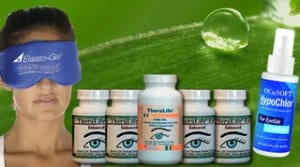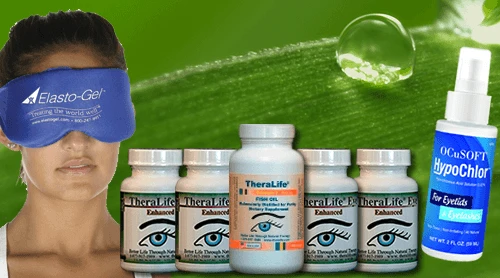To effectively manage ocular rosacea, it’s crucial to avoid dietary triggers such as spicy foods, alcohol (particularly red wine), and processed high-sugar foods, as these can exacerbate symptoms in sensitive individuals. While individual responses may vary, these foods can increase pro-inflammatory mediators and worsen ocular discomfort. Monitoring personal reactions and prioritizing whole, unprocessed foods supports ocular health.
Theralife is dedicated to enhancing the well-being of those suffering from ocular conditions with their unique oral eye treatment care—unlike any other on the market. Their products are specifically designed to alleviate various eye issues, offering a natural approach to reduce inflammation and promote eye health. With Theralife‘s specialized treatments, customers can find relief from ocular discomfort and maintain better overall eye health.
Powerful Relief With TheraLife
Chronic dry eye is a significant feature of ocular rosacea.
Treating dry eyes will reduce inflammation and keep ocular rosacea under control
Key Takeaways
- Alcohol, especially red wine, is a well-established trigger that can worsen both skin and ocular rosacea symptoms.
- Processed foods high in sugar and refined carbohydrates can increase inflammation and may aggravate ocular rosacea.
- Spicy foods are commonly suspected triggers, but most patients do not experience increased ocular symptoms after consumption.
- Hot beverages rarely cause ocular rosacea flares, though individual sensitivities may vary.
- Prioritize a diet rich in whole, minimally processed foods to help reduce ocular rosacea symptoms.
Spicy Foods and Hot Beverages

Although spicy foods and hot beverages are commonly perceived as rosacea triggers, current clinical evidence doesn’t consistently support their role in exacerbating symptoms.
You might assume that capsaicin sensitivity—stemming from chili peppers or other piquant ingredients—would directly aggravate ocular surface inflammation. However, controlled studies indicate that most patients don’t experience a significant worsening of ocular symptoms after consuming spicy foods.
Similarly, temperature sensitivity from hot beverages, such as coffee or tea, hasn’t shown a strong correlation with ocular rosacea flares in well-designed clinical trials.
It’s important to evaluate your unique responses, as individual variability exists. Overall, the consensus in recent literature suggests you shouldn’t universally eliminate spicy foods or hot beverages unless a clear, reproducible link to symptom aggravation is observed in your case. Additionally, proper hydration is vital for ocular surface health, which can help mitigate potential triggers from dietary choices.
Alcohol Consumption
In contrast to the debated role of spicy foods and hot beverages, alcohol consumption holds a more established association with rosacea, particularly in its cutaneous form. If you experience it, you should understand that alcohol—especially red wine—can precipitate vasodilation and exacerbate both dermatologic and ocular symptoms. Clinical studies demonstrate that red wine contains vasoactive compounds, such as histamine and tyramine, which heighten facial flushing and may worsen periocular inflammation. Beer brands, while variable in composition, can also contribute to flare-ups due to their alcohol content and fermentation byproducts. To minimize symptom severity, it’s advisable to monitor your reaction to specific alcoholic beverages and consider limiting intake, prioritizing abstention from red wine, which is consistently implicated as a potent trigger in rosacea pathophysiology. Regular follow-ups with healthcare providers are crucial to monitor symptom progression and tailor treatment plans for effective management.
Processed and High-Sugar Foods
While many dietary triggers for it remain under investigation, processed and high-sugar foods have gained attention for their potential to exacerbate inflammatory pathways.
When you consume processed snacks and sugary drinks, you introduce high concentrations of refined carbohydrates and artificial additives into your system. These substances may promote systemic inflammation and glycemic variability, which can intensify ocular surface inflammation and worsen rosacea symptoms.
Current evidence suggests that frequent intake of such foods may upregulate pro-inflammatory cytokines and oxidative stress, both implicated in the pathogenesis of rosacea. Inflammatory cytokines have been identified in the tears of patients with ocular rosacea, indicating a biological basis for the condition.
By minimizing your consumption of processed snacks and sugary drinks, you can help modulate inflammatory mediators and possibly reduce ocular discomfort.
Prioritizing whole, minimally processed foods supports ocular surface homeostasis and may improve your overall symptom management.
Powerful Relief With TheraLife
Chronic dry eye is a significant feature of it.
Treating dry eyes will reduce inflammation and keep ocular rosacea under control
Frequently Asked Questions
Can Dairy Products Worsen Ocular Rosacea Symptoms?
You may notice that dairy products can exacerbate ocular rosacea symptoms in some individuals, particularly if you have lactose intolerance or heightened sensitivity to dairy proteins.
Research suggests that pro-inflammatory mediators in dairy could intensify ocular surface inflammation.
If you experience symptom flares, consider incorporating dairy alternatives like almond or oat milk to minimize risk.
Always consult your ophthalmologist or dermatologist before making significant dietary changes to manage ocular rosacea effectively.
Are There Specific Fruits or Vegetables to Avoid?
Think of your diet as a double-edged sword—some fruits and vegetables, while healthy, can exacerbate ocular rosacea.
You should minimize highly acidic fruits like oranges, lemons, and tomatoes, as their fruit acidity may trigger flare-ups.
Likewise, vegetables rich in histamines, such as eggplants, spinach, and avocados, can heighten inflammatory responses.
Clinical evidence suggests identifying individual sensitivities and maintaining a symptom diary helps tailor dietary modifications for ideal symptom management.
Is Caffeine From Tea or Coffee a Trigger for Ocular Rosacea?
You may experience ocular rosacea flare-ups if you have caffeine sensitivity, as some studies suggest caffeine can exacerbate symptoms in susceptible individuals.
Both tea and coffee contain caffeine, potentially triggering vasodilation and ocular surface inflammation. However, evidence remains inconclusive, and individual responses vary.
If you notice symptom worsening after consuming these beverages, consider caffeine-free beverage alternatives, such as herbal teas or decaffeinated options, to minimize risk while maintaining hydration and comfort.
How Does Gluten Intake Affect Ocular Rosacea?
It’s no coincidence that you might notice ocular symptoms flare after eating gluten if you have gluten sensitivity.
When you consume gluten, your immune system can trigger an inflammation response, increasing vascular permeability and exacerbating ocular surface irritation.
Scientific literature doesn’t universally link gluten to ocular rosacea for everyone, but if you’re sensitive, gluten may worsen your symptoms.
You should monitor your diet and consult a clinician to determine any correlation specific to your case.
What Role Do Food Allergies Play in Ocular Rosacea Flare-Ups?
Food allergies and food intolerances can exacerbate ocular rosacea by triggering immune-mediated inflammatory responses.
When you consume allergenic foods, mast cell degranulation may increase histamine release, intensifying ocular surface inflammation and vascular dilation.
Allergy testing helps you identify specific triggers, enabling targeted dietary modifications.
Clinical evidence suggests individualized management of food intolerances can reduce symptom frequency and severity, improving quality of life and minimizing flare-ups.
Always consult a healthcare professional for tailored guidance.
Powerful Relief With TheraLife
Chronic dry eye is a significant feature of ocular rosacea.
Treating dry eyes will reduce inflammation and keep ocular rosacea under control
Conclusion
When managing ocular rosacea, it’s essential to consider how dietary changes might impact your symptoms. Evidence suggests that avoiding certain triggers such as spicy foods, alcohol, and processed sugars can help reduce inflammation and prevent flare-ups. These substances are known for their vasodilatory and pro-inflammatory effects, which can worsen ocular rosacea. Clinical studies support the idea of minimizing these dietary triggers to better control symptoms.
Additionally, for those seeking comprehensive care, TheraLife offers unique benefits. It is the only company providing oral eye treatment care, which can significantly enhance your ocular surface health. TheraLife’s products have been transformative for many, addressing various eye conditions and supporting overall eye health. By adjusting your diet and incorporating TheraLife’s specialized products, you may experience noticeable improvements in managing ocular rosacea and other related eye conditions.





